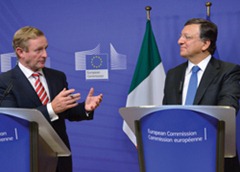Irish EU presidency: funds industry reform
 Negotiations on financial services reform will co-incide with Ireland’s EU presidency and could have a significant impact in Dublin.
Negotiations on financial services reform will co-incide with Ireland’s EU presidency and could have a significant impact in Dublin.
The Irish funds industry “must be prepared for change” and therefore stay engaged with Europe as significant reform decisions approach, Financial Regulator Matthew Elderfield has emphasised. The Central Bank’s Deputy Governor expects Ireland’s Presidency of the Council of the European Union, in early 2013, to be a key time.
In Q2 2012, the value of the 12,426 Irish-administered funds stood at a record €2.16 trillion. Fifty-two per cent of promoters were US-based with a further 32 per cent from the UK. Most funds (€935 billion) are managed under the UCITS Directive and therefore can be freely marketed across the EU once registered in one member state.
Ireland’s abstention from the EU financial transactions tax is designed to prevent a flight in assets from the IFSC to London. The move will prove unpopular with France and Germany but Ireland has a potentially strategic role in setting the financial services agenda during its presidency.
As with all sectors, Ireland’s funds industry dipped in the recession, falling in value from €1.42 trillion in Q4 2008 to €1.21 trillion in Q2 2009. However, the value of assets has seen almost continuous growth since that trough.
In his keynote speech to the Irish Funds Industry Association (IFIA) in September, Elderfield stressed that maintaining high regulatory standards was vital to the sector’s future success. In practice, investor protection must ensure an appropriate risk profile for the customer, adequate disclosure to investors so that they can make an informed choice about risk, tackling operational risks related to asset valuation or protection, and reducing the risk of fraud and other financial crimes.
Ireland can add additional regulations but Elderfield noted a trend towards “less national disceretion.” This made engagement in Europe an “immediate and pressing” need.
The Alternative Investment Fund Managers Directive would be “mostly completed” by the end of the year, and would regulate the non-UCITS sector e.g. hedge funds, private equity funds and real estate funds. In the light of the Directive, Irish law will be reviewed to ensure that it still promotes the public interest.
Elderfield commended the IFIA on its corporate governance code for fund service providers but was disappointed that Central Bank fund authorisations still relied on manual processes and hard copies. Reform here would not only involve moving to electronic processes but “challenging ourselves to ensure our process is as efficient as possible” and the industry’s advice was welcomed.
Close supervision of all funds was “impractical or at least prohibitively expensive” but the failure of an individual fund would have a limited potential impact on financial stability. The Central Bank’s PRISM system calculates the level of regulation required for each firm, and therefore determines the frequency of monitoring and inspection.
Regulatory reform would seek to reduce the probability of investor runs from money market funds, curb implicit support from sponsors and reduce the need for a tax-payer bail-out.
His own preference was for European and US policy to align, but Europe may need to take the lead as the US Securities and Exchange Commission seemed unlikely to take further action in the short term. Capital buffers, dilution levers for exiting investors and tighter liquidity measures were among the options.
The IFIA will be seeking further investment through a network of 10 representative offices around the world, including three new sites in Shanghai, Frankfurt and Sydney. “This demonstrates the IFIA’s commitment to having a presence in all our key growth markets to better promote Ireland as the jurisdiction of choice,” Chief Executive Pat Lardner has said.
Fund management provides around 12,000 jobs in the State and Northern Trust’s decision to increase its Limerick workforce from 300 to 700 indicates the sector’s relevance to Ireland’s recovery.





